Kid Curry and the Great Northern Train Robbery

Harvey Logan, better known as Kid Curry to his friends and enemies, was no stranger to Mon - tana. As a matter of fact, his criminal career had started here.
It was where, some years earlier, he had committed his first murder.
Harvey and his friend Jim Thornhill moved onto a ranch near what is now Choteau County, Montana. Curry and his brothers were hard workers, but they played as hard as they worked. Money sluiced through their hands like water through a gold pan. They could spend two weeks' pay during one weekend with a few soiled doves and a half dozen bottles.
The details of that first murder are sketchy. A local miner named Landusky came over to Logan's place to confront him—Landusky had it in his mind that Harvey had corrupted his daughter, Elfie. A fight ensued, which Logan won, followed by an arrest for assault. Logan attempted to correct what he evidently saw as an uneven score by approaching Landusky at a bar and hitting him with his pistol. Landusky drew. So did Logan. Logan shot. Landusky died.
Later, Elfie would claim that she had had a relationship with Lonny Logan, not Harvey. Harvey didn't reckon that it much mattered—the judge and Landusky were buddies. When he was released pending trial, Harvey Logan skipped town. Some time between his leaving, already pursued by Pinker - tons, and joining Butch and Sundance's so-called Wild Bunch, he ceased to be Harvey Logan and became Kid Curry. That transformation entailed becoming a legend.
Kid Curry the legend acquired a reputation as the "wildest of the Wild Bunch," and is estimated to have killed some eleven men, nine of them law enforcers. He was also a man of lusty appetites, so infamous for his dalliances with dozens of prostitutes that even today there are those who try to trace their descendance from him. They call themselves the Curry Kids. There might well be a few here in Montana.
But the robbery of the Great Northern near Malta may still be his most famous and daring exploit.
He managed to make a lot of cash in the robbery, but whether he or his crew would ever be able to spend it would be another question.

In 1866, three years before the transcontinental railroad was completed, a band of daring early adopters realized that trains made tempting targets. They carried payroll, the mail, and, occasionally, well-to-do passengers. Valuables like cash and precious metals tended to be placed in a safe somewhere on the train. All you had to do was open it.
That meant enlisting the help of the one person paid not to give it to you, the expressman. The expressman was essentially an armed courier given the job of ensuring that the shipment of precious metals would reach its destination safely. Increasingly, that meant defending the safe, as well as its combination, which only the ex - pressman knew. So in order to rob the train, you'd have to convince the expressman that your claim to the contents of the safe was valid using whatever tools you had at your disposal. Failing that, you could always kill him and just blow the safe with dynamite.
As Curry and his criminal associates prepared to rob the Great Northern train near Wagner, he must have been thinking about the abject failure of the Sundance Kid, his fellow Wild Bunch member, to rob the same train just a few years before. In that instance, Sundance had forgotten that the Express had left St. Paul on a Sunday, when banks were closed. After the Expressman opened the safe without much protestation, they realized their mistake; their take amounted to some $68 in checks and packages—hardly worth the risk to their lives.
But guys like Kid Curry and Sundance lived as much for the action as for the take. In 1901, after their disastrous robbery, they drank to the train's crew and rode back to Malta, where word of the robbery reached not long after. Sundance escaped, but the lesson was learned: make sure there's money in the safe before you knock a train over.
This time, Kid Curry knew there was money aboard. He, along with a Texan by the name of Ben Kilpatrick and a recently released prisoner named "Deaf Charley" Hanks (who had served six and a half years for robbing a Northern Pacific train), aimed to perpetrate a perfect robbery of Great Northern No. 3, and to actually make some money at it.
Hanks waited with some horses by a bridge down the track while Kilpatrick bought a ticket and Kid Curry snuck onto the baggage car. The conductor noticed that something was wrong and pulled the emergency stop cord, but Logan was too fast. He reached the engine cab and aimed his pistol at the engineer and the fireman, ordering them to get the train moving again until they reached the spot where Hanks waited.
The conductor rushed to the front of the train, enlisting the help of a sheriff and a brakeman along the way. Kilpatrick, from his vantage in the passenger car, saw the men drawing their guns and walking with purpose. Kilpatrick drew his own gun and fired at them, one bullet badly wounding the brakeman, who survived, but lost the arm.
The train slowed as it approached the bridge. Curry and Kilpatrick fired out the windows of the train to dissuade the curious from sticking their heads outside. Then they disconnected the passenger and express cars from the rest of the train, ordered the mail clerk and an express messenger named Smith out of the train, and set about blasting the doors off of the safe. After three charges, it worked. They found that the safe contained nearly $40,000 in cash, silk, silver coins, and jewelry.
Satisfied, they mounted their horses and prepared to leave, but not before Smith, the express messenger, begged Curry to indulge him with a souvenir—something to help him remember being held up by the great Kid Curry. Curry obliged. He fired all the remaining rounds in his pistol and then tossed it to Smith for a keepsake, having plenty of reason to be ebullient: the train robbery had come off without a hitch, a few injured passengers and a lawman's arm notwithstanding.

If Curry, Kilpatrick and Deaf Charley had laid low a while before trying to spend their money, they might have gotten away with it, but just four months later, Kilpatrick would be arrested for forging his signature on the stolen banknotes in St. Louis. Kilpatrick served another ten years for the crime, was released in 1912, and then killed trying to rob a train in Texas that same year. Deaf Charley evaded the law for longer, but died sooner than Kilpatrick. Detectives shot Charley to death in a San Antonio whorehouse in April 1902.
Curry's fall would be inextricable from that of his lover, Della Moore, a young prostitute he met at a Texas brothel. By the time he robbed the Great Northern, Moore had given up the life of a sporting woman in exchange for traveling with Curry in between jobs. But in October of 1901, she made the same mistake Kilpatrick did, exchanging stolen bills in Nashville. She was arrested and would never see Curry again. Heartbroken, she returned to prostitution when she heard Curry had been killed. Some say she was more than Curry's moll: that they were married, and he was the love of her life. Some say she went straight again, becoming a teacher before dying in the late 1920s.
Curry's end is mysterious, but not without controversy. Everyone agrees that in December of 1901 he shot a Tennesee lawman, and that the Pinkertons were hot on his trail. He got himself arrested in 1903 and then escaped jail again.
In 1904, Curry met what was most likely his final end. The job was, again, a train robbery, this time outside of Parachute, Colorado. Some outlaws stopped to steal some fresh horses during their getaway. The ranchers organized a shooting posse after discovering the missing horses.
 Someone fitting Curry's description was shot during a skirmish with the posse. The bullet tore through the man's bicep, entered his chest cavity, exited out the other side, and tore through his other bicep as well. The man knew the score. He struggled to raise his shattered arm, pressed the pistol to his temple, and fired.
Someone fitting Curry's description was shot during a skirmish with the posse. The bullet tore through the man's bicep, entered his chest cavity, exited out the other side, and tore through his other bicep as well. The man knew the score. He struggled to raise his shattered arm, pressed the pistol to his temple, and fired.
Still, there are those who held that, whoever that ill-fated man was, he wasn't Curry. Curry, those folks argue, joined Butch and Sundance in Bolivia. Much like rumors of Sundance's longevity, such stories seemed to cast a nostalgic shadow over the waning West, telling the listener not to worry, that it was still a world of cowboys and outlaws after all.
But there may have been a more practical reason to entertain the possibility that Curry was still alive. For the Pinkertons, who commanded princely sums to protect the train companies from would-be robbers, the news that one of the nation's most feared train robbers was definitely very dead might have tamped down on their business. With the dream, or rather the nightmare, of men like Kid Curry still alive, the Pinkertons would buy a few more years of job security.
Which ending do you like better? The one where Curry died an inveterate criminal whose final murder was his own rather than let some greenhorn posse member have the satisfaction? Or the one where Curry lived another twenty or thirty years, becoming old, feeling the strength of his limbs ebb away until he ceased to be a legend and became like you and me: just another cowpoke? Which would you rather have: the truth or the legend?

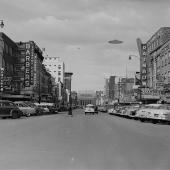
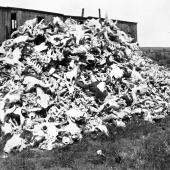

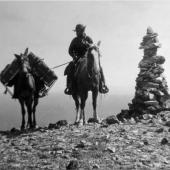
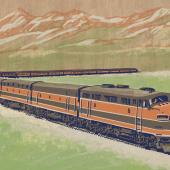
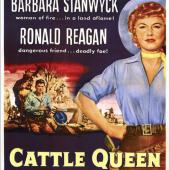
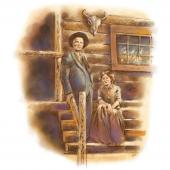
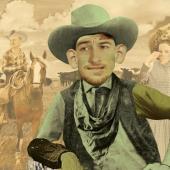
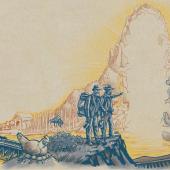
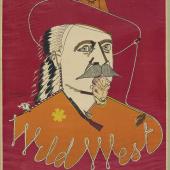

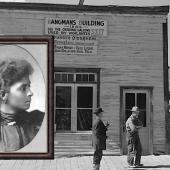
Leave a Comment Here